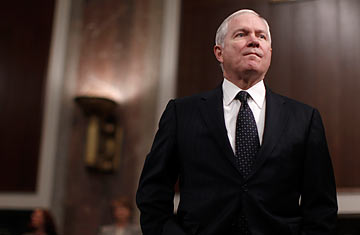
Secretary of Defense Robert Gates arrives to testify before the U.S. Senate Armed Services Committee on Capitol Hill
Defense Secretary Robert Gates is responsible for overseeing the U.S. wars in Afghanistan and Iraq, but on Thursday, May 20, he took on a new war — on Capitol Hill, after a congressional panel added nearly half a billion dollars to next year's defense budget for a jet engine the military insists it doesn't need. Gates called the move "a waste of money" and promised that the Pentagon "will strongly resist efforts to impose programs and changes on the department that the military does not want, cannot afford, and that takes dollars from programs and endeavors the military services do need."
Gates' attack followed a decision by the House Armed Services Committee to add $485 million to next year's $726 billion defense budget (which includes $159 billion for the wars in Afghanistan and Iraq) to begin development of a second engine source for the Pentagon's single-engine F-35 fighter, the largest defense program in history.
This is a serious showdown even for a man who has made challenging politicians and the military brass on unnecessary spending a hallmark of his tenure. Gates has already plucked the low-hanging fruit from the Pentagon money tree, ending production of the Air Force's F-22 fighter and the Army's Future Combat System last year. Both were seen by many as Cold War hangovers, giving even politicians cover for their termination. But now come tougher decisions.
Gates doesn't believe starting a second assembly line to produce an alternate F-35 engine from another manufacturer makes sense. Big bucks are at stake: the program, which is slated to procure more than 3,000 planes for the Air Force, Navy, Marines and several foreign militaries over the next two decades, will see some $100 billion spent on engines, currently slated to be built solely by Pratt & Whitney of East Hartford, Conn. But various lawmakers want to create a second assembly line in Cincinnati, Ohio, run by General Electric and its partner, Rolls-Royce, arguing that competition will keep prices down. Gates, believing that the upfront costs of producing a second engine won't generate sufficient savings to justify the cost, tried and failed to kill the second engine last year. Now he is urging President Obama to veto the defense bill if it arrives on his desk with funds for the competitive engine again.
Gates said Thursday he wouldn't have telegraphed the veto threat without Obama's backing. Whether that is sufficient to derail the two-engine scheme as it works its way through Congress remains to be seen, but it's a make-or-break point for Gates' plan to cut what he sees as questionable Pentagon spending, often forced on the military by lawmakers more concerned with well-paying jobs back home than national security.
But the virtues of competition make Gates' argument tougher this time around. Various studies suggest it will cost about $2 billion to launch production of a second engine, money the Pentagon says is not worth spending even if it means forfeiting possible savings down the road. Gates said Thursday that the GE engine proposal lowballs its costs, is based on an inadequate design and has only 200 hours of testing, compared with 13,000 for the Pratt power plant. "We're in favor of competition," he said. "But my idea of competition is winner takes all."
Government auditors have estimated that the added cost of launching a second engine-assembly line would be recouped over the aircraft's 30-year life span by keeping engine prices down. The Pentagon is not so sure. "There is not a good analytical case that the upfront costs of the second engine would be paid back," Ashton Carter, the nation's top weapons buyer, said May 4. But many experts back the two-source approach. "Previous competitive engine procurement shows the cost will go down and the performance will go up," says Winslow Wheeler, a defense procurement expert. "Leaving the whole game to Pratt & Whitney virtually guarantees that the cost will go up."
Not surprisingly, Ohio's Senators strongly back the bid from GE, which currently supports about 1,000 jobs. "Giving an extraordinary large contract to a single vendor without competition is fiscally reckless and irresponsible," says Republican George Voinovich. Democrat Sherrod Brown adds that "Ohio's workers make the best engines in the world, and the government should not arbitrarily choose one engine over another." The GE–Rolls-Royce team has said it will produce its engine for the Pentagon at a fixed price starting in 2012. "Our offer creates a compelling business case to make competition affordable in the near term and position the program to reap the much larger recognized benefits of competition over the long run," David Joyce, president of GE Aviation, noted April 27.
Such talk led Senator Joseph Lieberman of Connecticut to pipe up at a recent congressional hearing. He backs the monopoly approach of Pratt, which employs thousands of his constituents, and offered a new argument in favor of the Connecticut company. "GE has offered to make it a fixed-price contract," he said, "and I gather that Pratt-Whitney has essentially done the same." Sometimes, it seems, the mere threat of competition works as well as the real thing.
